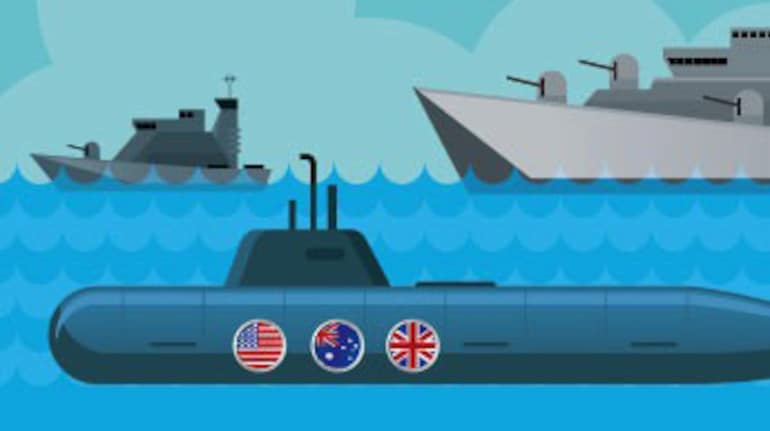
The “Somewhat” Conundrum:
Lack of Communication Bedevils AUKUS Support
David Vallance / The Interpreter
(June 21, 2023) — The latest Lowy Institute Poll reveals Australians are no more
convinced about the merits of the subs deal than last year. Reflecting Australia’s changing strategic environment, the government has a new and — as the public is often told — ambitious strategy to preserve and achieve national interests.
However, though all these policy and budgetary announcements were done with much fanfare — think AUKUS nuclear-powered submarine announcements to the recent release of the Defence Strategic Review (DSR) — for all this talk there has been very little communication.
The 2023 Lowy Institute Poll shows that the Australian public has not been meaningfully convinced of the merits of AUKUS for the country and for the region. Australians appear uncertain as to why the government is undertaking the biggest defence project in the country’s history.
This is not just about the nay-sayers and “hand-wringers”, or even the most vociferous supporters. It is far more about the don’t-knowers and the somewhaters.
The 2023 Lowy Institute Poll shows that despite wall-to-wall coverage of the submarine announcement in San Diego last March and the often fiery debate it provoked, overall levels of support have not shifted substantially — 70% to 67%.
The proportion of Australians who are strongly against the acquisition of nuclear-powered submarines also remains steady from last year (10%). However, the proportion who are strongly in favour of the plan has dropped by seven points to 26% in 2023.
Equally interesting are somewhats. In 2022, 17% of Australians were “somewhat against” acquiring the submarines, with 37% “somewhat in favour”. This year, those numbers are 21% and 41% respectively. These results show a relatively stable perception of the plan, but also that the largest group of supporters are in the “somewhat” camp.
So while a majority of Australians do support the plan, no one is more convinced on its merits than they were last year. While this should not necessarily be read as scepticism, it should be read as reflecting a lack of clarity about the plan. Defence has not done enough to convince Australians about why the plan is in their interests. And this is not just limited to the act of acquiring the submarines.

Forty-seven per cent of Australians say that the price tag of anywhere from $268 to $368 billion is not worth the additional capability that these platforms will ostensibly provide. Just over a quarter — 27% — say this cost is worth it, but most interestingly, another 27% of Australians say that they don’t know one way or the other.
Additionally, while 28% of Australians say that acquiring the submarines will help deter conflict and ensure stability in the Indo-Pacific — outnumbering the 20% who say it will increase the risk of regional conflict and instability — more than half say it will either make no difference (32%) or that they don’t know (20%).
For a project that is billed as an epochal shift in Australia’s strategic outlook and posture, these figures reflect a poor level of communication that began right at the outset of the unveiling of the plan in September 2021.
The secrecy that surrounded AUKUS was breathtaking. You would be hard-pressed to think of another project with costs and implications so great that was kept under wraps until the very moment of its announcement. This secrecy had immediate negative impacts on Australia’s relationship with the French — it is never good to have the leader of a friendly nation call the PM a liar.
But secrecy then is not the key issue with AUKUS — it is a lack of clarity and information since.
Nor is this only an AUKUS issue. Australia has a tendency to embark on major Defence projects that are plagued with issues that the public only becomes aware of when they have become potentially disastrous. The MRH-90 helicopters languished on the Australian National Audit Office’s Projects of Concern list for a decade before being scrapped, and now the future Hunter-class frigates threaten to have a similar fate.
That project’s ineffective tender process, incomplete value-for-money assessments, and poor delivery on milestones, will almost certainly be a key factor in the ongoing review into the Royal Australian Navy’s surface combatant fleet, to be handed to government in September.

No one is asking the Chief of the Defence Force, Secretary of Defence, or the Minister to regularly divulge national secrets on the 6 o’clock news. But if AUKUS is to be achieved successfully, the public must be convinced that the expenditure is worthwhile in terms of the strategic effects it will produce, as well as justifiable against all the other responsibilities of government, such as healthcare, education and housing.
If they are not, the agreement will fracture. Australia would then have spent vast amounts of money with no major return; it will have done severe damage to its reliability in the eyes of the United States and United Kingdom, not to mention France; and will have diminished its credibility among Asian neighbours.
Converting those “somewhats” and “don’t knows” requires increased transparency to build public understanding of when and where issues and shortcomings might arise, and how they can best be addressed.
As the DSR says, Australia is pursuing a policy of national defence. An easy way to make progress on that line is with national communication.
Who Is the Real Threat in the Pacific?
Global Network Against Weapons & Nuclear Power in Space
(June 23, 2023) — US-UK-NATO are provoking conflict with China. It’s similar to their strategy against Russia where they use Ukraine as a proxy.
In this case, the west uses Hong Kong and Taiwan as an excuse to militarily encircle China and expand its bases throughout the Asia-Pacific region.
This growing aggression from the west puts the entire region in the middle of any shooting war that might begin.
The time to publicly denounce the US-UK-NATO war mongering is now.
Resources
• Watch this new video here
• See links to all past Global Network monthly educational videos here